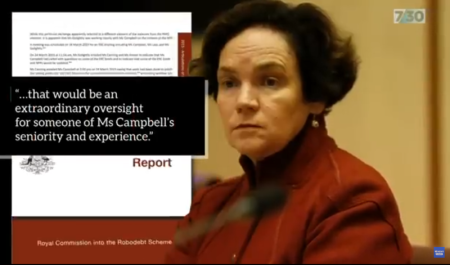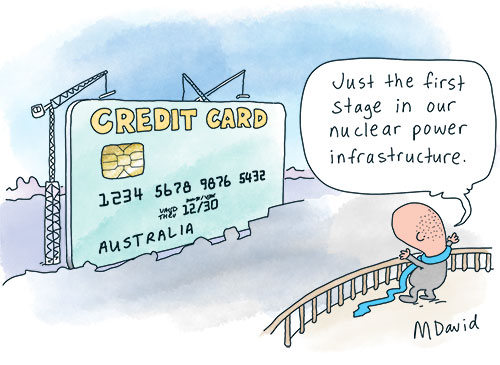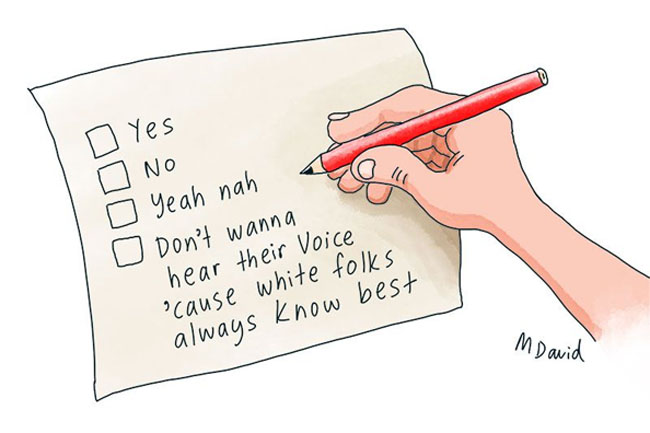Criticism of Prime Minister Anthony Albanese is growing as the Labor Government contends with some of the tougher issues affecting Australians, writes Michael Galvin.
ONLY A YEAR or so ago, it seemed as though Prime Minister Anthony Albanese's honeymoon would never end. All the signs pointed to him becoming a great Labor prime minister, leading a talented cabinet, pursuing a left-of-centre agenda and being assured of multiple terms in office.
A year ago, most polls also showed that a clear majority of Australians supported the Voice to Parliament (at least insofar as they cared to understand it).
And yet now, in this winter and springtime of national discontent, the Voice is dead, and Albanese looks as though he's floundering. As the astute journalist Niki Savva put it last month, referring to the Qatar/Qantas fiasco, if the Prime Minister continues like this, he will be soon out of a job.
As Savva wrote, regarding the airline mess:
‘It doesn’t qualify as a crisis, but there will be one, someday, and if the Government manages it in the same way, it will end with the elimination of the Prime Minister and or whichever minister is involved.’
The fact is, Albanese has been stumbling in a very public way from one shambles to another in recent times. Consider the following four matters of public importance which have dominated the news and elicited much public discussion. Cumulatively, they suggest the need for an urgent reset for a Labor Government so many of us have so much invested in.
First, the (ongoing) Qantas/Qatar fiasco.
That this ever became an issue that lasted weeks rather than hours (and is still not settled) is extraordinary. But the signs were not good from the get-go, when Albanese stubbornly refused to entertain the possibility that his son being a member of the Qantas Chairman’s Lounge was highly inappropriate, even offensive. Did he seriously believe that a 23-year-old with no track record (apart from being the Prime Minister’s son) could actually deserve this perk from a business highly reliant on his father’s government’s support for its profitability?
Then it got worse. Day after day, the Transport Minister did not seem able to give straight answers to simple questions. That obduracy continues.
Why was Albanese not able to see that airline ticket price gouging is a red-hot issue during a full-blown cost of living crisis? Did he not know that protecting Qantas was keeping international airfares at least 10 per cent higher than they would otherwise be, according to a former Qantas economist? Does he not know that Australia is a country of immigrants, meaning that most Australians need to be able to travel to many other countries (and states) where they have families, for “small” things like births, weddings, honeymoons, funerals and so on?
For parents with adult children living in other Australian cities, the going rate for a relevant air ticket is probably more closely watched than interest rates.
As for the argument that protecting Qantas is in the national interest, I note that the Qantas international fleet spent most of the COVID period resting up in a desert somewhere in North America, while airlines like Qatar were the only continuing links with the outside world. So much for national interest in a global emergency.
Second, the nonsensical COVID Inquiry.
As if his challenge with the Voice wasn’t enough, Albanese decided to announce his long-awaited COVID Inquiry just three weeks out from referendum day. What inept timing this was. What was the PM thinking?
Without going into detail, this writer was confronted with a life-and-death situation in another state while living in Melbourne during the 2020 lockdowns. Armed with doctor’s letters, I assumed that I would easily get an exemption to enable me to travel. Wrong. Instead, I got a young man on the phone telling me not to bother applying for an exemption to travel. Absolutely no way, unless someone happened to be dead, he said nonchalantly.
I eventually got to my destination, but not before spending thousands of dollars for two weeks in the Howard Springs quarantine facility, plus airfares from Melbourne to Darwin, then Darwin back to my destination. Transiting through a deserted Melbourne Airport when all the lights were turned off and full of police is a memory that will not quickly fade.
Only a hermit in a cave would think that lockdowns and border closures were not major issues for millions of Australians during COVID. But were they the best practice? Was the pain and stress necessary for the greater good, or not? How serious were all the unintended consequences?
Naively, I had assumed that Albanese’s promised inquiry would address such fundamental matters. But no. Albanese’s “defence” has been that the states are carrying out their own reviews of such matters. It’s an insult because surely it’s the comparative aspect that matters — what can be learned by collating decisions made by all the states and evaluating them? If it’s not a national focus needed for such national matters, then whose focus is it?
As if ignoring lockdowns and border closures were not bad enough, the review also failed to include sundry other matters, such as social distancing, contact tracing, or the effects of school closures on children, not to mention their parents (mostly mothers). Even Labor-friendly media called this farce of a review out for what it is.
And so to the committee of three announced to manage this Inquiry. Two of them are former senior federal public servants, while the third is a member of the medical establishment. Unbelievably, all three are from inside the tent when what is needed are brilliant minds from outside the tent, with no vested interests (conscious or unconscious) in defending either their own former bureaucracy or the medical establishment.
Given that COVID was a global event, one might have thought expertise and experience from other countries were useful, too. But no. Two Canberra public servants and a health professor it is.
Like most people, I have friends whose initial refusal to accept COVID vaccination has now evolved into fully-fledged conspiracy theories about government, freedom and individual sovereignty. And even opposition to the Voice. I was laughed at when I suggested to them that the Government would want to unearth all the facts about COVID and public responses to it. Clearly, the laugh is on me.
This review seems designed to ignore a social movement that is morphing into all sorts of dangerous territory. When about 40 million Americans think the last election was rigged, and Joe Biden is not a legitimate President, then conspiracy theories are no longer a fringe issue. And as goes America, so does Australia in so many ways, as we have just seen with the Voice debate. This Clayton’s review seems expressly designed to play into such conspiratorial cynicism.
And then there is its timing — in the middle of a divisive referendum campaign and just when the “Yes” side seemed to be getting back a bit of momentum. Hard to get more ham-fisted than that.
Third, the self-destructive housing debate.
For over a year, as well as being a national crisis universally acknowledged, this had been a running sore for the Government. Most of the criticism is coming from the Greens, thus making Labor look stingy and churlish in its obstinacy. And then, suddenly, voila! Another billion is found for housing and the Greens are back on board. A billion is very small beer in the context of the Federal Budget. And yet Albanese allowed this wound to bleed for a year before agreeing to a relatively simple fix.
Why would he do this? Is stubbornness and an inability to tack quickly in the face of changing circumstances emerging as his Achilles heel?
Fourth, the ill-fated Voice.
That Albanese passionately believed in the Voice position put in the Referendum is a given. That he worked his guts out for the cause is a given. But it is also a given that a couple of million Australians shifted from a “Yes” to a “No” during the last 12 months.
That nauseous negativity, cruel misinformation and unbridled racism have dominated public discourse for the last few months is as deplorable as it is depressing. Yet in a country with a racist history like Australia’s, it was also entirely predictable. And a certainty, once bipartisan support was lost.
But the “Yes” side seemed taken by surprise by the opposition. No one, including Albanese, was effective in fighting back. While the execrable Senator Jacinta Price was landing cannonball after cannonball, the “Yes” side seemed to be responding with feathers and Hallmark cards. Given the harm already caused, Albanese must accept some responsibility for not being able to anticipate and then counteract this outburst of great Australian ugliness.
Consider this uncomfortable fact: If Albanese had not linked constitutional recognition with the Voice to government, there most likely would have been bipartisan support for both propositions and the hideousness of recent months would have been avoided, or at the very least marginalised. Yes, it would not have given First Nations people everything they asked for on a symbolic level, which was extremely modest to begin with, but they are not getting anything now for the foreseeable future, except the knowledge that a majority of Australians have said “No” to the Uluṟu Statement From the Heart.
In the proposed wording, Albanese stubbornly gave no concessions to the Opposition. Was Albanese being too cute by half? Both wanting to do the right thing by First Nations people and wedging Opposition Leader Peter Dutton at the same time? Of course, Dutton might have reneged, he clearly feels no need to keep his word. But once bipartisanship was lost, defeat was almost inevitable.
The future?
It’s worth noting that the four issues outlined here involve four different ministers, the only common denominator being the Prime Minister. Hard to believe that all four ministers are duds. Unfortunately for Albanese, these four issues also have another thing in common. Rather than being stuff-ups dealing with relatively esoteric or obscure matters, each of these are hot-button populist issues, affecting nearly everyone and easy to become emotional and worked up about around the water cooler or the family barbecue.
They matter. They affect people. They are occurring both largely simultaneously and during a very painful cost of living crisis that also affects working people badly. They demand swift and effective crisis management from the government of the day — the Albanese Government. So far, they haven’t got it.
Can Albanese pull himself out of his current flight path into disaster and disappointment? We can only hope.
Michael Galvin is an adjunct fellow at Victoria University and a former media and communications academic at the University of South Australia.
Related Articles
- Albo is bringing out Australia's feminine side
- To ward off the 'Teals', Labor must deliver in government
- Albo’s team sets employment records, despite job categories disappearing
- Albanese needs to rethink Labor strategies to secure voters
- Honeymoon is over for Albanese's Labor
 This work is licensed under a Creative Commons Attribution-NonCommercial-NoDerivs 3.0 Australia License
This work is licensed under a Creative Commons Attribution-NonCommercial-NoDerivs 3.0 Australia License
Support independent journalism Subscribe to IA.















